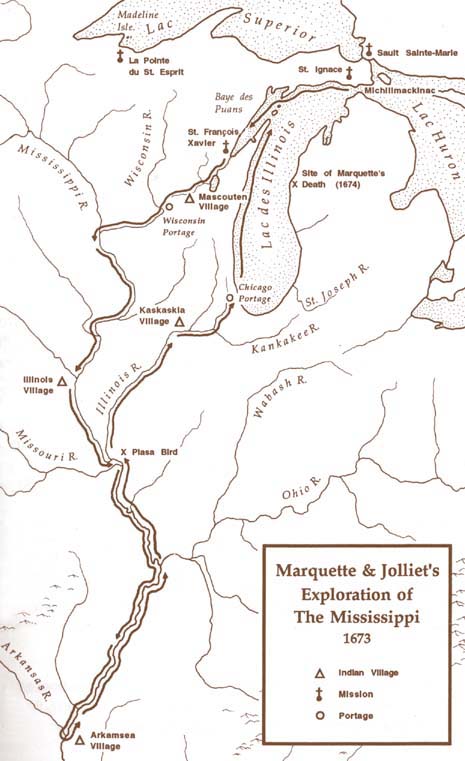On May 17, 1673, Father Jacques Marquette and Louis Jolliet, a skilled cartographer and fur trader, set out on a four-month voyage that carried them thousands of miles through the heart of North America to explore the path of the Mississippi River. The Mississippi's vastness awe-struck them, and they recognized its potential as a major route for trade and exploration.
sidebar
Louis Jolliet likely met Father Marquette at the Jesuit mission at Sault Ste. Marie. Born near Quebec, Joliet had been destined for the priesthood when he decided to change course and become a fur trader.
Their voyage helped to initiate the first non-Indian settlement in the North American interior that introduced Christianity into 600,000 square miles of wilderness, gave French names to cities in Wisconsin and Illinois, transformed traditional Indian cultures, and nearly exterminated the fur-bearing mammals of the Upper Midwest.
The two explorers were an unlikely pair. Father Jacques Marquette was a studious Jesuit two weeks shy of his 36th birthday. His partner, Louis Jolliet, was a 27-year-old philosophy and cartography student who had become a fur trader.
sidebar
The word "Mississippi" comes from the Ojibwe Indian Tribe (Algonquian language family) word "Messipi" or "misi-ziibi," which means "Great River" or "Gathering of Waters." French explorers, hearing the Ojibwe word for the river, recorded it in their own language with a similar pronunciation. The Potawatomi (Algonquian language family) pronounced "Mississippi" as the French said it, "Sinnissippi," which was given the meaning "Rocky Waters."
Marquette and Jolliet did not discover the Mississippi. Indians had been using the "Sinnissippi" for thousands of years, and Spanish explorer Hernan De Soto had crossed it more than a century before them. They confirmed that the native peoples who lived along the route were generally friendly and that the natural resources of the lands in between were extraordinary. Equipped with this information, French officials led by the explorer LaSalle would erect a 4,000-mile network of trading posts to systematically exploit those riches over the next century and a half.
They left St. Ignace at the head of Lake Michigan on May 17, 1673. They crossed Wisconsin between June 1 and June 17, then followed the Mississippi River hundreds of miles south to Arkansas.
sidebar
The five voyageurs (names unknown) were almost certainly of French-Canadian or Métis (mixed French and Indian) heritage. They were knowledgeable in wilderness survival, skilled canoeists, guides, and outdoorsmen, making them essential to the success of the expedition.
In June of 1673, Father Jacques Marquette, a Jesuit missionary, and Louis Jolliet, a fur trader and skilled cartographer, entered what is now the state of Illinois during their groundbreaking exploration of the Mississippi River. They began their journey in May from St. Ignace in present-day Michigan, intending to find the river's course and potential route to the Pacific Ocean. While their exact duration within Illinois borders is somewhat debated, they spent a significant amount of time exploring the region, likely staying roughly a month before continuing their trip in July.
As they paddled their canoes down the Mississippi, they made an essential encounter with members of The Illinois (aka Illiniwek or Illini) Confederacy. The Illinois comprised several Indian tribes consisting of the Kaskaskia, Cahokia, Peoria, Tamarais (Tamaroa, Tamarois), Moingwena, Mitchagamie (Michigamea), Chepoussa, Chinkoa, Coiracoentanon, Espeminkia, Maroa, and Tapouara tribes that were of the Algonquin family. They spoke Iroquoian languages. The Illinois called themselves "Ireniouaki" (the French word was Ilinwe).
These tribes were welcoming, and the explorers learned much about their culture and way of life. Marquette, fluent in several native languages, likely used his skills to communicate and foster peaceful relationships. The Illinois shared vital information about the river's course and warned of potential dangers downstream, including hostile tribes.
The relationship between the explorers and the Illinois people were mainly friendly; they engaged in trade and shared information. Marquette, a Jesuit missionary, was keen to learn about their customs and languages while also seeking to introduce them to Christianity.
While in Illinois, Marquette and Jolliet meticulously documented the land they traversed. Marquette likely kept detailed journals of their observations, noting the abundance of wildlife, fertile soil, and diverse plant life they observed. As a cartographer, Jolliet would have carefully mapped out the landscape and river, creating valuable records for future French exploration. Marquette's journal is a valuable historical source offering insight into the geography, flora, fauna, and the lives of the Indians they encountered.
Despite the valuable knowledge and hospitality they received from the Illinois people, Marquette and Jolliet eventually decided to turn back. Rumors of conflicts further south and fears of encountering Spaniards convinced them that continuing the journey was too risky. They reasoned that they had discovered enough to confirm that the Mississippi River emptied into the Gulf of Mexico, not the Pacific Ocean. Thus, they began their return journey in July after a relatively short stay within Illinois' boundaries.
A significant part of their Illinois travels involved venturing up the Illinois River, a major tributary of the Mississippi. This fertile river valley was teeming with wildlife and rich agricultural potential. They likely encountered villages along the river banks, interacting with more members of the Illinois Confederacy.
On September 30, 1673, they arrived at St. Francis Xavier Mission at modern DePere, Wisconsin.
Marquette and Jolliet's expedition solidified French claims to the territory, paving the way for later colonial expansion into the Mississippi River valley and the establishment of Illinois Country.
Additional Reading:
Complied by Dr. Neil Gale, Ph.D.



No comments:
Post a Comment
The Digital Research Library of Illinois History Journal™ is RATED PG-13. Please comment accordingly. Advertisements, spammers and scammers will be removed.